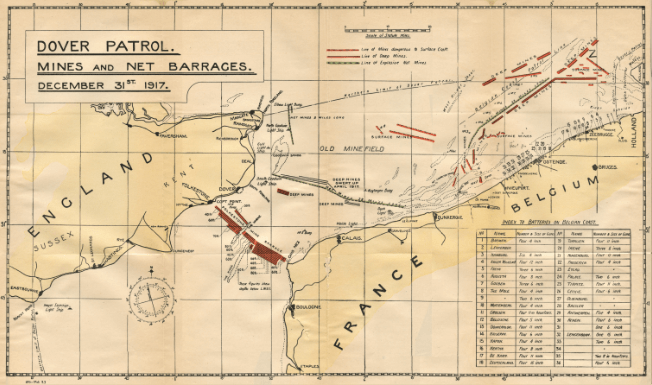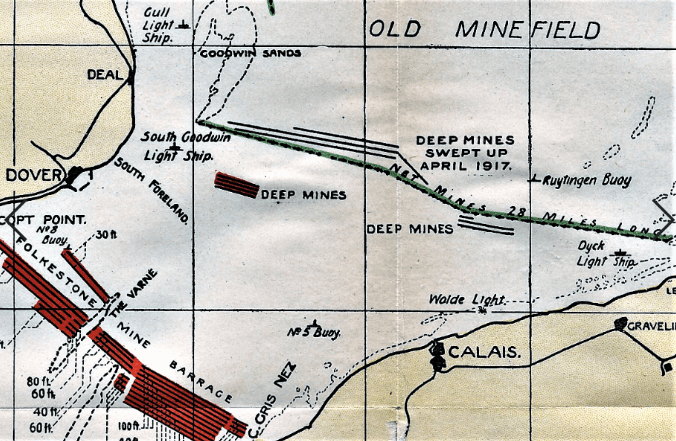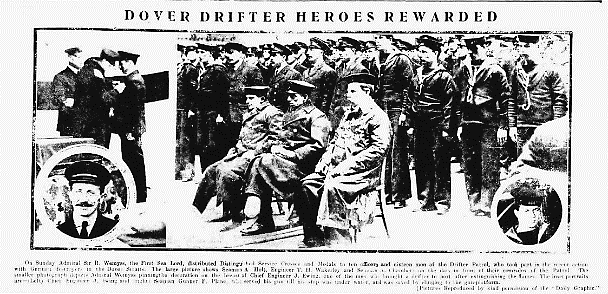There are many stories of First World War Bravery Awards being given for acts of astonishing courage. Here, Maritime Archaeology Trust (MAT) volunteer, Roger Burns, takes a look at the British ships and crews targeted by a German destroyer raid off the coast of Dover on the night of 14-15 February 1918, which resulted in the loss of eight steam-driven vessels.
THE SHIPS
The vessels involved are listed here along with the number of crew lost from each indicated in the brackets: Clover Bank II (12), W. Elliott (6), Christina Craig (10), Cosmos (11), Jeannie Murray (15), James Pond (3), Silver Queen (9) and Veracity (1). Other vessels that survived the war but were damaged in the same raid included requisitioned drifters utilised as net vessels, namely Golden Gain (1), Golden Rule (3) and Violet May (8), plus Admiralty minesweeper paddle steamer Newbury (12). The full list of the 91 crew lost is available here.
The James Pond was a steel-hulled Admiralty Castle Class Naval trawler, No. 3515, completed in June 1917 by Smith’s Dock Company Ltd. of Stockton. Except for HMS PS Newbury, the others were all requisitioned drifters. Newbury, steel-hulled, was built on the Clyde. The three surviving drifters were wooden-hulled English East Coast-built fishing vessels. Wooden-hulled vessels lost included Clover Bank II built at Banff and Christina Craig built at Findochty near Buckie, and English East Coast-built were W. Elliott, Cosmos and Jeannie Murray. Silver Queen and Veracity were steel-hulled English East Coast-built. Armament of the drifters comprised single guns, 3 or 6 pdrs. The James Pond had 1×12 pdr.
WHY ATTACK THE DOVER PATROL?
The Dover Patrol was an RN command based in Dover and Dunkirk that operated throughout the war. Although it conducted other operations, its primary task was to monitor barriers and defences in the Dover Straits to prevent German U-boats from gaining access to the English Channel. It was considerably successful. Of an estimated 125,000 supply ships that passed through the area, only 73 were lost to German submarines. These defences as of 31 December 1917 are shown in Figure 1.

Zeebrugge, the location of one of the German U-boat Flotilla bases, can be seen on the right of the map and can be read about here and here. The Dover net barrage did not prevent submarines making the passage, but it did cause many U-boat sorties to be routed round the north of Britain to gain access to the western end of the Channel.
An expanded and focussed section of this map is in Figure 2. The area where the eight vessels were lost lies between Dover and the Deep Mines.

The history of the Dover Patrol is available from several sources, including Volume 1 of 2 by Admiral Sir Reginald Bacon K.C.B., K.C.V.O., D.S.O.
THE ATTACK
The German raid on the night of 14-15 February 1918 was one of their most successful against the net defence vessels manning the defences. The Shields Daily News of 16 February 1918 included an article:
A GERMAN REPORT.
An official telegram from Berlin, dated yesterday, says: —On the night of February 14th, our torpedo boats under the command of Captain Heinecke made a surprise attack on strong forces guarding the English Channel between Calais and Dover and Cape Grisnez and Folkestone. A large guardship, numerous armed fishing trawlers, and several motor boats were forced to give battle, and the major part of these was destroyed. Our torpedo boats suffered no losses or damage, and have all since safely returned.
There was extensive coverage of the raid in the British Press, some reports including photographs of the casualties. An Admiralty report in the Mid Sussex Times of 19 February stated that “A swift raid was made by a flotilla of large enemy torpedo-boat destroyers at about 1am on our patrol forces in the Dover Straits…….the craft sunk were occupied hunting a submarine which had been sighted in the patrol…….After having sunk the vessels the enemy destroyers returned rapidly to the North before any of our forces could engage them”.
FIRST WORLD WAR BRAVERY AWARDS: MEDALS FOR THE DOVER DRIFTER HEROES

Figure 3 is from the Dover Express, 8 March 1918, from which the below excerpts are paraphrased:
“On Sunday, Admiral Sir R. Wemyss, the First Sea Lord, distributed Distinguished Services Crosses and Medals to ten officers and sixteen men of the Drifter Patrol, who took part in the recent action with German destroyers in the Dover Straits. The large picture shows Seaman A. Holt, Engineer T.H. Wakerley and Seaman A. Chambers on the dais in front of their comrades of the Patrol. The smaller photograph depicts Admiral Wemyss pinning the decoration on the breast of Chief Engineer J. Ewing, one of the men who brought a drifter to port after extinguishing the flames. The inset portraits are: – (Left) Chief Engineer J. Ewing and (right) Seaman Gunner F. Plane, who served his gun till his ship was under water, and was saved by clinging to the gun platform”.
Medals were awarded to those involved in the drifter action by Sir Rosslyn Wemyss, the First Sea Lord, on behalf of the King. The men of the Dover Patrol received a guard of honour from the Royal Marine Light Infantry. Sir Wemyss commended the men, in particular, for being back out on the night after the attack, continuing their duties.
The list below details all the honours presented at the event along with further detail on the specifics of the action and the measures taken following the attack, for which the metals were given.
BAR DISTINGUISHED SERVICE CROSS
Lieutenant Alexander D. Thompson. D.S.C., R N R., commanding officer of a paddle minesweeper received the bar to the D.S.C.. Lieut. Thompson’s vessel was heavily shelled and considerably damaged, the first salvo wrecking the bridge and wireless telegraph room, Lieut. Thompson’s cabin underneath the bridge. The officer on the bridge was killed outright. Throughout he maintained a cool demeanour, and succeeded in getting his vessel clear. It was finally towed into Dover Harbour, stern first.
Chief Skipper A. E. Berry, D.S.C., RNR., of the armed trawler ”James Pond”‘ was too ill to attend to receive his bar to the D.S.C. The wheel-house of his vessel was pierced, wrecked, and set on fire by a shell. Berry, wounded in the legs, remained cool and collected, and ordered all hands to lie down until the firing had ceased. He then superintended the effort to extinguish the fire. The hose had been blown to pieces, and he got it replaced. They failed to put out the fires, and he gave the order “Abandon ship.” The falls of the boat had been destroyed, but they man-handled her, and he and the crew got away and were landed on the French coast.
DISTINGUISHED SERVICE CROSS
Engineer-Lieut. A. A. Kirkham, R.N.R. also on the “James Pond” stuck to his post in the engine-room and kept the pumps going until steam failed.
Skipper Harry Bennett rendered valuable assistance to Chief Skipper Berry in his efforts to save the vessel after it had been shelled and set on fire.
Skipper J. Turrell, R.N.R. (T.) displayed great courage and coolness giving the necessary orders to save his ship, although one of the most severely injured thereon, three out of the crew of ten being dead, and three severely injured.
Skipper S. A. Head, R.N.R. (T.) displayed gallantry and presence of mind in keeping his ship afloat by blocking holes with beds and blankets when badly holed by two four-inch shells.
Skipper J. Mair, R.N.R. (T.) displayed great coolness and presence of mind when his ship, the “W. Elliot,” was sunk with the loss of seven hands, and he himself was injured.
CONSPICUOUS GALLANTRY MEDAL
Engineman John Ewing, R.N.R. (T.). and Engineman Alexander Noble, R.N.R. (T.). received the C.G.M. When their ship had been severely damaged and was on fire and all the men killed, with the exception of Second-hand Charles Barber, who was very severely injured and quite helpless, having since died of wounds, and Deckhand V. Disney, who was wounded in one leg and badly burnt and of little assistance, they cleared the wreckage of the boom from a small boat, got out the boat, into which they put their wounded shipmates and got away. Finding that their ship did not sink, they returned to her, attacked the fire with buckets, and succeeded in putting out the flames, the small-arms ammunition in the wheelhouse exploding as they worked. They then got their injured shipmates on board and made them comfortable, and afterwards burnt flares of old clothes soaked in paraffin until picked and towed in at 7 a.m.
2nd Hand George Bertie Rivett., R.N.R. (T.). of the “Cosmos”, who received the C.G.M., displayed great courage and presence of mind when his vessel was sunk. He went overboard after a small boat which was drifting; later put his lifebelt on severely wounded engineman of the sunken “Silver Queen”, and then assisted to save the life of Engineman Wakerley, of his own vessel, until he became unconscious.
DISTINGUISHED SERVICE MEDAL
Engineman James Wakerley, R.N.R. (T.), though severely wounded in the foot (which was afterwards amputated), helped Rivett, who had become unconscious in the water whilst trying to save him, until he also became unconscious shortly before they were picked up.
A.B. Horace Neller, R.F.R., S.T., strongly recommended by his Commanding Officer, Lieut. Thompson, rendered very great assistance in the examination of the ship after it had been heavily shelled and holed below the water-line, displaying the utmost gallantry throughout.
Deckhand George Miller Barnes, R.N.R. (T). strongly recommended by his Commanding Officer, Lieut. Thompson, for gallant behaviour. When members of the searchlight crew of his ship were killed, he showed the greatest courage in creeping along the deck of the steamer and switched off the searchlight while the vessel was under heavy gunfire.
2nd Hand Alfred Boynton, R.N.R. (T.). of the “James Pond” heavily shelled and set on fire. Two men were killed outright, and the third mortally wounded, but he maintained his calmness throughout and rendered very valuable assistance to his Commanding Officer, Chief Skipper Berry, in replacing the hose, which had been destroyed by an explosion, and in the subsequent unsuccessful efforts to subdue the fire.
Engineman Alexander Sandison, R.N.R. (T.). remained cool and collected throughout, and was of very great assistance in replacing the hose on the “James Pond” and in the unsuccessful efforts to subdue the fire.
Deckhands Maurice Beaton, R.N.R. (T.), John Brown, R.N.R. (T.). and Alfred Towner, R.N.R. (T.). with their ship very severely damaged, having three out of her crew of ten dead and three severely injured, displayed great courage and energy in carrying out all orders of their skipper, who was himself one of the most severely injured.
Deckhands John Sharman, R.N.R. (T.). and Alfred George Holt, R.N.R. (T.). displayed gallantry and presence of mind keeping their ship afloat blocking holes with beds and blankets when badly holed by two four-inch shells.
Deckhand Frederick Plane, R.N.R. (T.)., the sole survivor of the “Cloverbank”, remained on board until his ship was rapidly sinking and he could not see or hear anyone on board. He continued firing his gun at twenty yards range from the enemy, until they sank the vessel. As the drifter was going down, he jumped overboard with his gun platform, and was picked up some time later.
Loading Deckhand William Gullage, R.N.R., and deckhand Alfred Chambers, R.N.R. (T.). – Gullage displayed great courage when his ship, the “Veracity”, was sunk by the enemy, encouraging his shipmates in a small boat, in which were eleven men, five of whom were wounded (one since dying of wounds), and in which they were for four hours. Chambers gallantly stuck to an oar, although his hands were badly burned.
MENTIONS
Lieutenant John Anderson, R.N.R., Lieutenant Robert Lee Bell, R.N.V.R., and Skipper Robert Scott, R.N.R. were each recommended because of the courage and devotion to duty they displayed in proceeding in search of the paddle minesweeper commanded by Lieut. Thompson when a message was received that it was in distress. In spite of the fact that German destroyers were known to be about, they burned flares continually during the search, although by so doing they made their vessels targets for any enemy vessel to aim at.
During the war, fishing trawlers were requisitioned by the Royal Navy for mine sweeping and Escort duties. The crews were enlisted into the RNR and the ‘T’ designated Trawler Division. Find out more about naval sea mines by reading another of Roger’s articles here.
REFLECTIONS ON FIRST WORLD WAR BRAVERY AWARDS
The effect of the Dover Barrage and the contribution of the Dover Patrol was instrumental in limiting the passage of German submarines from their North Sea bases into the English Channel and were of considerable benefit to the Allied war effort by reducing the number of ships lost. The effectiveness of the Barrage contributed to why the Germans saw the need to attack. Under cover of darkness, the rapid German torpedo boats achieved some success but at a price to the Dover Patrol in vessels and men who, typical of those involved in the First World War, displayed great fortitude. A recurring theme during the awards ceremony was mention of “cool demeanour” and “displayed the utmost coolness and devotion to duty, and behaved in a most courageous manner”.
Those who lost their lives are remembered at the Commonwealth War Graves Commission.
Extra reading
Find out more about wrecks of the First World War in the English Channel by reading our booklet, ‘Forgotten Wrecks: Shipwrecks of the Channel Crossing’.
